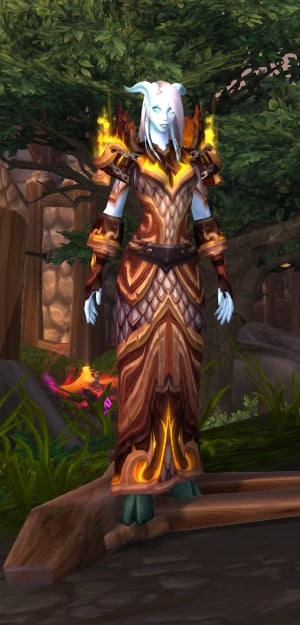
Remember when World of Warcraft launched? I sure do. I remember when the game’s developers strapped into a helicopter and broke into the building of every game’s development team and forced them to change their code to more closely align with what World of Warcraft was doing, instantly transforming Warhammer Online into a close clone of their own game. And then there was that time that stores stopped handing out copies of Star Wars Galaxies to potential players, with a cleverly disguised installer that made people think they were going to be playing a Star Wars game right up until the character creator. “Hey, that’s not a twi’lek! Oh, well, as long as I’m here…”
Wait, that didn’t happen? Of course it didn’t. That would be absolutely ridiculous. But you wouldn’t know that from listening to the narrative told by some portions of the MMO fanbase.
I was not brought into the space of online gaming by World of Warcraft, but I have been playing it for a very long time, and I’ve seen oh-so-many stories blaming it in an oblique way for the current state of the industry whilst neglecting the huge amount of evidence that points in a completely different direction. While I might not be happy with many of the decisions that Blizzard has made over the years with the game, painting it as the villain in the grand history of the genre is missing some pretty obvious cues and ignoring what I think is a truism: If it hadn’t been WoW, it would have been something else.
 The Star Wars effect
The Star Wars effect
I’m sorry to say that the internet seems to have eaten it over the past several years, but there was a fascinating article I read a while back on the real state of the blockbuster movie culture. You can blame Titanic if you want, but blockbusters really hit the scene with the launch of Jaws and, more notably, Star Wars. The idea suddenly hit that films could be visual spectacles, that you could amass huge ticket sales on individual movies, that making a production full of bombast and special effects and terrible dialogue was not a shortcut straight to the bottom of the B-movie barrel. Collectively, the filmmaking world flipped out, and I hear even that American Graffiti guy got into the action.
So studios wanted blockbusters. But that was hardly the fault of Star Wars itself, a film that had an insanely troubled production and very nearly didn’t get distributed. I’m reluctant to call it anyone’s fault at all. A paradigm shift took place, just like when Babe Ruth hit a baseball for the first time or when The Beatles stepped off a plane. Or when World of Warcraft launched.
If you look at the games released in close proximity to World of Warcraft, you’ll notice that they share a pretty close structure. Guild Wars and City of Heroes are my usual points of nearby reference, and both of them follow (or followed) a quest-and-go structure very familiar to anyone who cut her teeth on WoW‘s initial experience. But you can’t call them clones of one another; they all launched too close together and were deep enough in development that the structure must have been informed by an outside source rather than by one another.
I’ve gone on the record before saying that if it hadn’t been for World of Warcraft, it would have been something. A game was bound to take the world by storm, and you can see the pieces arranged nicely in those close contemporaries. These games were built based on what players wanted at the time, even if people changed their minds after the fact.
The hook brings you in
Make no mistake, the populations flocking to WoW when it launched were composed of MMO players tired of heavy grinds, unstructured spaces, and attention to real-life details that no one really wanted replicated in the online space. But the idea persists somehow that if WoW vanished tomorrow, suddenly (insert preferred title of choice) would gain an influx of players because everyone would realize how shallow and unenjoyable the game really was — that WoW steals players who would otherwise be playing sandbox games or open PvP games or whatever.
This is pretty obviously ridiculous. The popularity of World of Warcraft and the unpopularity of, say, Mortal Online are two unconnected points. Removing one would not bolster the other.
What WoW can definitely assume credit or blame for is massively raising awareness and interest in the genre of online gaming. You may not like the style of game that it aims to be, but claiming that it’s not an MMO because you aren’t waiting for a boat for four days or given the option of spending the entire game as a farmer is like claiming that Mega Man isn’t a platform game because it doesn’t star a dude named Mario. If you can’t understand why people flocked to the game when it launched, you’re probably not the right person to discuss whether or not it succeeds or fails at its goals because you don’t understand those goals in the first place.
 The runaway success of the game has definitely altered the development of many, many titles. Again, though, that’s not on WoW. Star Wars Galaxies losing subscribers (let’s say directly to WoW just for argument’s sake) and then making sweeping changes that pleased basically no one just means that there were a large number of people playing the game for something they weren’t getting, and the studio then decided to close the barn doors after the horses were out. It was poor decision-making, but it shows a breakdown in a thought process first and foremost.
The runaway success of the game has definitely altered the development of many, many titles. Again, though, that’s not on WoW. Star Wars Galaxies losing subscribers (let’s say directly to WoW just for argument’s sake) and then making sweeping changes that pleased basically no one just means that there were a large number of people playing the game for something they weren’t getting, and the studio then decided to close the barn doors after the horses were out. It was poor decision-making, but it shows a breakdown in a thought process first and foremost.
Games that radically altered themselves as a result of a runaway success or games that refused to acknowledge why that runaway success took place, in other words, are to blame for their own failings. I’m sad to see so many games bill themselves as throwback sandboxes because that implies not bothering to understand why the genre has changed and moved forward, focusing instead on an idealized version of the past that never actually existed.
My days of having WoW as my first and foremost love have passed, certainly, and I’m very critical of some staggeringly poor choices that have been made in the game of late. But it’s a groundbreaking game, and there are a lot of staggeringly good choices that have been made over its history. If you can’t understand why it was the first blockbuster MMO title or what that meant in the larger scheme, that’s on you — not on the game itself.
Feedback, as always, is welcome in the comments below or by mail to eliot@massivelyop.com. Next week, I want to talk about design slide and how WoW has wound up on a weird arc that’s led almost back to the same place we started from. By the way, I’m making use of WoW’s new in-game Twitter integration to do in-character tweeting as the urge strikes me, so check out @TruceSMV if that seems like your thing.
 War never changes, but World of Warcraft does, with a decade of history and a huge footprint in the MMORPG industry. Join Eliot Lefebvre each week for a new installment of WoW Factor as he examines the enormous MMO, how it interacts with the larger world of online gaming, and what’s new in the worlds of Azeroth and Draenor.
War never changes, but World of Warcraft does, with a decade of history and a huge footprint in the MMORPG industry. Join Eliot Lefebvre each week for a new installment of WoW Factor as he examines the enormous MMO, how it interacts with the larger world of online gaming, and what’s new in the worlds of Azeroth and Draenor.














